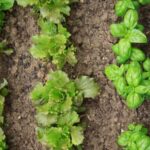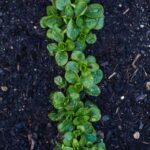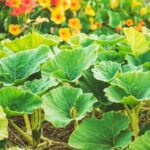Is black earth good for vegetable gardens? This is a common question among gardeners and those looking to cultivate their own produce. The choice of soil can greatly impact the health and yield of vegetables. In this article, we will explore the benefits and drawbacks of using black earth in vegetable gardens, as well as provide guidance on its usage.
Black earth, also known as topsoil or humus, is a type of soil that is rich in organic matter and nutrients. It is often revered for its ability to support healthy plant growth, making it a popular choice for gardeners. The nutrient content of black earth plays a vital role in the development of vegetable plants, making it a key factor in determining its suitability for vegetable gardens.
When it comes to vegetable gardening, the nutrient content of the soil is crucial for successful growth and production. Black earth is known for its high levels of essential nutrients such as nitrogen, phosphorus, and potassium, which are necessary for healthy plant development. These nutrients promote strong root systems and vibrant foliage, ultimately leading to a bountiful harvest of vegetables.
What Is Black Earth?
Black Earth, also known as black soil or chernozem, is a type of fertile soil that is rich in organic matter. It is typically found in the grasslands of the world, such as the Great Plains of North America, the pampas of South America, and the steppes of Russia. What sets black earth apart from other types of soil is its high humus content, which gives it its dark color and nutrient-rich composition.
The composition of black earth consists of a balanced combination of sand, silt, clay, and organic matter. This balance allows for excellent drainage while also retaining moisture and nutrients, making it an ideal environment for promoting healthy plant growth. The high organic matter content in black earth provides essential nutrients to plants and supports beneficial microbial activity in the soil.
One key characteristic of black earth is its friable structure, which means that it has a crumbly texture that is easy to work with. This makes it an excellent choice for vegetable gardens, as it allows for good root penetration and aeration. Additionally, the dark color of black earth helps to absorb and retain heat from the sun, creating a favorable environment for warm-season crops.
| Content | Relevant Data |
|---|---|
| Composition | Sand, silt, clay, organic matter |
| Fertility | High humus content; rich in nutrients |
| Structure | Friable texture; easy to work with |
Nutrient Content
Black earth, also known as “chernozem,” is a type of soil that is characterized by its dark color and rich nutrient content. It is formed through the natural decomposition of plant and animal matter over thousands of years, resulting in a soil that is extremely fertile and well-suited for agricultural purposes.
One of the key benefits of black earth for vegetable gardens is its high nutrient content. This type of soil is rich in organic matter, such as humus, which provides essential nutrients for plant growth. Additionally, black earth contains high levels of nitrogen, phosphorus, and potassium – essential elements for healthy vegetable plants. These nutrients are readily available to the plants, promoting strong root development, vibrant foliage, and bountiful harvests.
In addition to its mineral content, black earth also supports a diverse community of microorganisms that contribute to soil fertility. Beneficial bacteria and fungi help break down organic matter in the soil, releasing nutrients that are easily absorbed by plant roots. This microbial activity not only enriches the soil but also improves its structure, making it easier for vegetables to take up water and nutrients.
The nutrient-rich nature of black earth makes it an ideal choice for vegetable gardens. Its ample supply of essential minerals and organic matter provides a nourishing environment for plants to thrive. With regular maintenance and proper care, vegetable gardens grown in black earth can yield abundant crops year after year.
pH Levels
Black earth, also known as black soil or chernozem, is a type of soil that is rich in organic matter and nutrients. It is characterized by its dark color, which is due to the high content of humus, decomposed plant and animal material. Black earth is known for its fertility and ability to support the growth of various plants, making it a popular choice for vegetable gardens.
One of the key reasons why black earth is good for vegetable gardens is its high nutrient content. It contains essential nutrients such as nitrogen, phosphorus, potassium, and micronutrients like calcium and magnesium. These nutrients are vital for the healthy growth of vegetables, promoting strong roots, lush foliage, and bountiful harvests.
The pH level of black earth is another factor that makes it beneficial for vegetable gardens. Most black earth soils have a slightly acidic to neutral pH range, which is ideal for many types of vegetables. The pH level affects the availability of nutrients in the soil and can impact the overall health and productivity of vegetable plants. Black earth’s optimal pH levels create an environment where vegetables can easily access the necessary nutrients for their growth.
| Advantages | Disadvantages |
|---|---|
| High nutrient content | Potential for compaction |
| Ideal pH levels | May be expensive to purchase |
| Good drainage and moisture retention | Possibility of excessive water retention in heavy rainfall |
Drainage and Moisture Retention
Benefits of Good Drainage
Good drainage is crucial for the health and growth of vegetable gardens. Without proper drainage, water can pool around the roots of plants, leading to root rot and other issues. Black earth, with its loose and crumbly texture, helps to facilitate good drainage in vegetable gardens. This means that excess water is able to drain away from the roots, preventing waterlogged soil and promoting healthy plant growth.
Moisture Retention Properties
In addition to promoting good drainage, black earth also has excellent moisture retention properties. The organic matter in black earth helps to hold onto moisture, ensuring that plants have access to water even during dry periods.
This can be especially beneficial for vegetable gardens during hot summer months when consistent watering may be challenging. The ability of black earth to retain moisture also reduces the frequency at which you need to water your vegetable garden, making it a low-maintenance option for many gardeners.
How Black Earth Improves Soil Structure
Furthermore, the use of black earth can improve the overall structure of soil in vegetable gardens. Its composition helps to prevent soil compaction, which can hinder root growth and nutrient absorption in plants. By incorporating black earth into your garden beds, you can create a looser, more aerated soil that promotes better root development and overall plant health.
By understanding how black earth aids with drainage and moisture retention in vegetable gardens, gardeners can make an informed decision about whether this type of soil is suitable for their particular gardening needs.
Pros and Cons
When considering whether to use black earth for vegetable gardens, it is important to carefully weigh the pros and cons. One of the biggest advantages of using black earth is its nutrient content. Black earth is rich in organic matter, which provides essential nutrients for plant growth. This can lead to healthier and more productive vegetable plants, ultimately resulting in a bountiful harvest.
Additionally, black earth is known for its ability to retain moisture while still allowing for proper drainage. This is crucial for vegetable gardens as it helps maintain consistent soil moisture levels, which is vital for healthy plant growth. Proper moisture retention also reduces the need for frequent watering, making it an ideal choice for those looking to conserve water in their gardens.
On the other hand, one potential disadvantage of using black earth is its pH level. While black earth is typically neutral or slightly acidic, it can vary depending on its composition. Some vegetables require specific pH levels to thrive, so it’s important to test the soil and make any necessary adjustments before planting. Additionally, some gardeners may find that black earth requires additional fertilization to supplement certain nutrients that may be lacking.
How to Use Black Earth
Black earth, also known as black soil or Chernozem, is a nutrient-rich soil that can greatly benefit vegetable gardens when used properly. Here are some tips and guidelines on how to effectively incorporate black earth into your garden:
- Prepare the Soil: Before adding black earth to your vegetable garden, it’s essential to prepare the existing soil. Remove any weeds, rocks, or debris from the area and loosen the soil to improve drainage.
- Amend the Soil: Once the soil is prepared, you can incorporate the black earth into the existing soil. Depending on your specific garden needs, you may need to mix it in thoroughly or simply layer it on top as a mulch.
- Consider pH Levels: Test the pH levels of your soil before adding black earth. If your vegetable garden requires more acidic conditions, you may need to make adjustments accordingly.
- Use in Raised Beds: Black earth can be particularly beneficial for raised bed gardens. Fill your raised beds with a mixture of black earth and compost to provide an optimal growing environment for your vegetables.
Incorporating black earth into your vegetable garden can provide numerous benefits such as improved nutrient content, enhanced moisture retention, and better overall plant growth. By following these guidelines and tips, you can ensure that you are using black earth effectively to maximize the potential of your vegetable garden.
Conclusion
In conclusion, black earth can indeed be a beneficial addition to vegetable gardens due to its nutrient content, pH levels, drainage, and moisture retention properties. The rich composition of black earth provides essential nutrients for the healthy growth of vegetables, while its optimal pH levels create a favorable environment for plant development. Additionally, the soil’s ability to promote proper drainage and retain moisture is crucial for sustaining the overall well-being of vegetable plants.
When considering whether to use black earth in vegetable gardens, it is important to weigh both the advantages and disadvantages. While black earth offers numerous benefits for plant growth, it may also have some drawbacks such as potential compaction and poor performance in certain soil types. Therefore, it is essential to assess individual garden needs and conditions before deciding on the use of black earth.
Overall, when used properly and in combination with other suitable soil amendments, black earth can contribute significantly to the success of vegetable gardens. By following recommended guidelines for incorporation and maintenance, gardeners can harness the benefits of black earth to promote healthy and flourishing vegetable crops. Ultimately, black earth can be a valuable asset in creating thriving and productive vegetable gardens.
Frequently Asked Questions
Is Black Earth Soil Good for Vegetable Gardens?
Black earth soil, also known as black soil or chernozem, is generally considered good for vegetable gardens due to its rich nutrient content and ability to retain moisture. This type of soil is typically high in organic matter, which helps provide essential nutrients to the plants.
Additionally, its dark color allows it to absorb and retain heat, promoting healthy plant growth.
What Is the Best Soil for a Vegetable Garden?
The best soil for a vegetable garden is one that is well-draining, rich in organic matter, and has a balanced pH level. It should ideally have a loose texture that allows the roots to penetrate easily and access water and nutrients.
Soil that is high in nutrients such as nitrogen, phosphorus, and potassium is beneficial for producing healthy and productive crops.
What Is the Difference Between Topsoil and Black Dirt?
The main difference between topsoil and black dirt lies in their composition. Topsoil refers to the uppermost layer of soil, usually the top 5-10 inches, which contains a mix of organic matter and minerals.
On the other hand, black dirt specifically refers to nutrient-rich soil that is dark in color due to its high organic content. While topsoil can vary widely in quality depending on its source, black dirt often indicates a higher concentration of valuable nutrients for plant growth.

If you’re looking to get into vegetable gardening, or are just looking for some tips on how to make your current garden better, then you’ve come to the right place! My name is Ethel and I have been gardening for years. In this blog, I’m going to share with you some of my best tips on how to create a successful vegetable garden.





